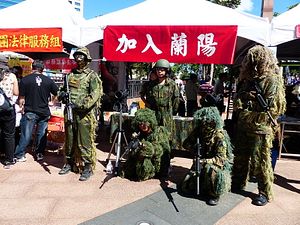On September 3, Taiwan celebrates 2019 Armed Forces Day to honor its military servicemembers and those who have fallen defending Taiwan. However, jet fighter shows and combat skill demonstrations can not distract from a fundamental challenge Taiwan’s military is trying to conquer: Transitioning to an all-volunteer force system.
Five years ago, Taiwan introduced an all-volunteer military system after reducing conscription for Taiwanese men born after January 1, 1994 to only four months of basic training (there is no conscription for women). Across partisan lines, Taiwanese administrations have gradually decreased conscription time from a peak of two years for the army and three years for the navy, air force, and marines.
Policymakers have countered widespread worries about transition challenges by arguing this all-volunteer force (AVF) will enhance Taiwan’s defense readiness despite significant personnel reductions as a smaller, better-trained force will be better suited to operate modern weapons. In an AVF, personnel changes are less frequent, with average service times in Taiwan on the rise. This allows for increased training investment and a build-up of experience among service personnel.
To successfully transition to an all-volunteer force, Taiwan’s Ministry of National Defense (MND) has raised salaries for military personnel and introduced a system of attractive bonuses and benefits, with military salaries for volunteer high school graduates even exceeding expected salaries of university graduates. New non-financial incentives to support the MND’s intensified recruitment efforts include expanded education opportunities for military personnel and improved military housing. Such efforts seem to be paying off, and the MND expects to fill its recruitment target of 90 percent in 2020.
However, high costs could force the Ministry of National Defense to further lower this targeted number of active duty volunteers to avoid feared budgetary trade-offs. As a result of the transition to an all-volunteer force, personnel expenses increased from 149 billion Taiwanese dollars (US$4.74 billion) in 2014 to NT$166 billion planned for 2020. Although the recent defense budget increase might alleviate current pressure to adjust the targeted number of personnel, budget cuts after the upcoming January 2020 presidential election are possible.
Moreover, with the current number of volunteers still well short of the target and planned continuous military pay increases, personnel expenses are likely to continue rising. The cost of the all-volunteer force therefore remains a central challenge to its success in Taiwan.
Furthermore, the intended personnel quality increase could fail to materialize. Chasing numerical targets, Taiwan’s military officials do not (yet) emphasize quality in their recruitment efforts. In addition, under the AVF system, the military no longer has guaranteed access to highly-educated youth, who were previously required to serve for at least a year. Increased average service time alone could be insufficient to raise overall expertise and capabilities in the expensive all-volunteer military.
Even if problems with cost and quality are solved, Taiwan’s demographics pose an existential threat to the AVF in its current form: By 2030 the number of Taiwanese men aged 15 to 29 is projected to decrease to 1.68 million, a reduction by almost a third from 2.43 million in 2015. Unless Taiwan’s military manages to recruit an unusually high percentage of the working age population, it will thus struggle to fill its ranks.
It is not yet clear how Taiwan will respond to these challenges. With capable reserve forces, a reduction of active-duty personnel could be thinkable, yet at current levels, this would impair Taiwan’s defense readiness. However, the only real alternative to reduced personnel numbers that does not risk budgetary trade-offs is reintroducing (longer) conscription, a proposition that might be considered akin to political suicide. Taiwanese leaders face uncomfortable policy choices in the years to come.
Vanessa Molter is a Master in International Policy candidate at Stanford University, where she focuses on International Security in East Asia. Currently, she studies Taiwanese security affairs at the Institute for National Defense and Security Research in Taipei, Taiwan, a government-affiliated defense think-tank. Follow her on Twitter: @vanessa_molter

































